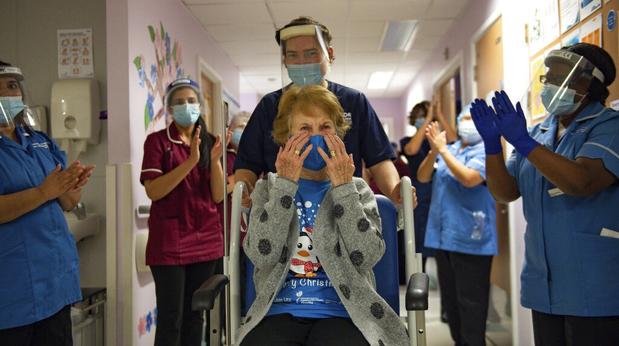 Margaret Keenan, 90, is applauded by staff as she returns to her ward after becoming the first patient in the UK to receive the Pfizer-BioNTech COVID-19 vaccine, at University Hospital, Coventry, England, Dec 8, 2020. (JACOB KING / POOL VIA AP)
Margaret Keenan, 90, is applauded by staff as she returns to her ward after becoming the first patient in the UK to receive the Pfizer-BioNTech COVID-19 vaccine, at University Hospital, Coventry, England, Dec 8, 2020. (JACOB KING / POOL VIA AP)
LONDON - Margaret Keenan, a 90-year-old grandmother from Northern Ireland, became the first person in the world on Tuesday to receive the Pfizer COVID-19 vaccine shot outside of a trial as Britain began vaccinating its population.
An early riser, Keenan received the Pfizer-BioNTech vaccine at her local hospital in Coventry, central England, on Tuesday morning at 0631 GMT, a week before she turns 91.
A video showed Keenan being pushed in a wheelchair out of the ward while nursing staff clad in protective gear lined the corridor to applaud and cheer, in an echo of moving video clips released through the year when COVID-19 survivors finally left hospital.
READ MORE: UK clears Pfizer COVID-19 vaccine for first shots next week
Britain is the first Western country to start immunizing its general population in what has been hailed as a decisive watershed in defeating the coronavirus.
“I feel so privileged to be the first person vaccinated against COVID-19,” said Keenan, as she received the shot from a nurse originally from the Philippines in front of a photographer and TV crew.
“It’s the best early birthday present I could wish for because it means I can finally look forward to spending time with my family and friends in the New Year after being on my own for most of the year.”
 Margaret Keenan receives the Pfizer-BioNTech COVID-19 vaccine, administered by nurse May Parsons at University Hospital, Coventry, England, Dec 8, 2020. (JACOB KING/POOL VIA AP)
Margaret Keenan receives the Pfizer-BioNTech COVID-19 vaccine, administered by nurse May Parsons at University Hospital, Coventry, England, Dec 8, 2020. (JACOB KING/POOL VIA AP)
Keenan, known as Maggie to her friends, is a former jewelry shop assistant who only retired four years ago. She has a daughter, a son and four grandchildren.
It’s the best early birthday present I could wish for because it means I can finally look forward to spending time with my family and friends in the New Year after being on my own for most of the year.
Margaret Keenan, Northern Ireland resident and the first person in the world to receive the Pfizer COVID-19 vaccine shot outside of a trial
Video footage showed her wearing a light blue mask, a grey cardigan along with a blue t-shirt with a penguin in snow and the message “Merry Christmas” as she received the shot in her left arm from nurse May Parsons.
'We will beat this together'
Parsons, one of many thousands of people from around the world employed in Britain’s National Health Service (NHS), where she has worked for 24 years, said the last few months had been tough, but there was now light at the end of the tunnel.
Britain is the worst-hit European country from COVID-19, with over 61,000 deaths. Prime Minister Boris Johnson hopes to turn the tide against the disease by rolling out the Pfizer/BioNTech vaccine before the United States or European Union.
ALSO READ: Fauci slams UK regulator on Pfizer review, then mutes critique
The mass inoculation will fuel hope the world may be turning a corner in the fight against a pandemic that has crushed economies and killed more than 1.5 million, although ultra-cold storage and tricky logistics will limit its use for now.
“Thank you to our NHS, to all of the scientists who worked so hard to develop this vaccine, to all the volunteers - and to everyone who has been following the rules to protect others,” Johnson said on Twitter.
“We will beat this together.”
British Health Secretary Matt Hancock and Stephen Powis, medical director for NHS England, said they both found it very emotional watching the vaccine programme rollout.
The BBC said the second patient to receive the jab in Britain was a man named William Shakespeare from Warwickshire.
Britain has ordered 40 million doses of the Pfizer/BioNTech shot. As each person requires two doses, that is enough to vaccinate 20 million people in the country of 67 million.
About 800,000 doses are expected to be available within the first week, with care home residents and carers, the over-80s and some health service workers the top priority to get them.


